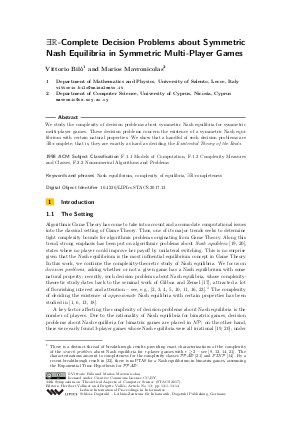Existential-R-Complete Decision Problems about Symmetric Nash Equilibria in Symmetric Multi-Player Games
Authors Vittorio Bilò, Marios Mavronicolas
-
Part of:
Volume:
34th Symposium on Theoretical Aspects of Computer Science (STACS 2017)
Part of: Series: Leibniz International Proceedings in Informatics (LIPIcs)
Part of: Conference: Symposium on Theoretical Aspects of Computer Science (STACS) - License:
 Creative Commons Attribution 3.0 Unported license
Creative Commons Attribution 3.0 Unported license
- Publication Date: 2017-03-06
File

PDF
LIPIcs.STACS.2017.13.pdf
- Filesize: 0.56 MB
- 14 pages
Document Identifiers
Subject Classification
Keywords
- Nash equilibrium
- complexity of equilibria
- ExistentialR-completeness
Metrics
- Access Statistics
-
Total Accesses (updated on a weekly basis)
0Document
0Metadata
Abstract
We study the complexity of decision problems about symmetric Nash equilibria for symmetric multi-player games. These decision problems concern the existence of a symmetric Nash equilibrium with certain natural properties. We show that a handful of such decision problems are Existential-R-complete; that is, they are exactly as hard as deciding the Existential Theory of the Reals.
Cite As Get BibTex
Vittorio Bilò and Marios Mavronicolas. Existential-R-Complete Decision Problems about Symmetric Nash Equilibria in Symmetric Multi-Player Games. In 34th Symposium on Theoretical Aspects of Computer Science (STACS 2017). Leibniz International Proceedings in Informatics (LIPIcs), Volume 66, pp. 13:1-13:14, Schloss Dagstuhl – Leibniz-Zentrum für Informatik (2017)
https://doi.org/10.4230/LIPIcs.STACS.2017.13
BibTex
@InProceedings{bilo_et_al:LIPIcs.STACS.2017.13,
author = {Bil\`{o}, Vittorio and Mavronicolas, Marios},
title = {{Existential-R-Complete Decision Problems about Symmetric Nash Equilibria in Symmetric Multi-Player Games}},
booktitle = {34th Symposium on Theoretical Aspects of Computer Science (STACS 2017)},
pages = {13:1--13:14},
series = {Leibniz International Proceedings in Informatics (LIPIcs)},
ISBN = {978-3-95977-028-6},
ISSN = {1868-8969},
year = {2017},
volume = {66},
editor = {Vollmer, Heribert and Vall\'{e}e, Brigitte},
publisher = {Schloss Dagstuhl -- Leibniz-Zentrum f{\"u}r Informatik},
address = {Dagstuhl, Germany},
URL = {https://drops.dagstuhl.de/entities/document/10.4230/LIPIcs.STACS.2017.13},
URN = {urn:nbn:de:0030-drops-70200},
doi = {10.4230/LIPIcs.STACS.2017.13},
annote = {Keywords: Nash equilibrium, complexity of equilibria, ExistentialR-completeness}
}
Author Details
References
-
P. Austrin, M. Braverman, and E. Chlamtac. Inapproximability of NP-complete variants of Nash equilibrium. Theory of Computing, 9:117-142, 2013.

-
V. Bilò and M. Mavronicolas. The complexity of decision problems about Nash equilibria in win-lose games. In Proceedings of the 5th International Symposium on Algorithmic Game Theory, volume 7615 of LNCS, pages 37-48, 2012.

-
V. Bilò and M. Mavronicolas. Complexity of rational and irrational Nash equilibria. Theory of Computing Systems, 54(3):491-527, 2014.

-
V. Bilò and M. Mavronicolas. A catalog of ∃ℝ-complete decision problems about Nash equilibria in multi-player games. In Proceedings of the 33rd Symposium on Theoretical Aspects of Computer Science, volume 47, pages 17:1-17:13, 2016.

-
V. Bonifaci, U. Di Orio, and L. Laura. The complexity of uniform Nash equilibria and related subgraph problems. Theoretical Computer Science, 401(1-3):144-152, 2008.

-
M. Braverman, Y. Kun-Ko, and O. Weinstein. Approximating the best Nash equilibrium in O(n^o(lg n)) time breaks the exponential time hypothesis. In Proceedings of the 26th Annual ACM-SIAM Symposium on Discrete Algorithms, pages 970-982, 2015.

-
G. W. Brown and J. von Neumann. Solutions of games by differential equations. Contributions to the Theory of Games, Annals of Mathematics Studies, (24):73-79, 1950.

-
J. Canny. Some algebraic and geometric computations in PSPACE. In Proceedings of the 20th Annual ACM Symposium on Theory of Computing, pages 460-467, 1988.

-
X. Chen, X. Deng, and S.-H. Teng. Settling the complexity of computing two-player Nash equilibria. Journal of the ACM, 56(3), 2009.

-
B. Codenotti and D. Štefankovič. On the computational complexity of Nash equilibria for (0, 1) bimatrix games. Information Processing Letters, 94(3):145-150, 2005.

-
V. Conitzer and T. Sandholm. New complexity results about Nash equilibria. Games and Economic Behavior, 63(2):621-641, 2008.

-
C. Daskalakis, P. W. Goldberg, and C. H. Papadimitriou. The complexity of computing a Nash equilibrium. SIAM Journal on Computing, 39(1):195-259, 2009.

-
A. Deligkas, J. Fearnley, and R. Savani. Inapproximability results of approximate Nash equilibria. In Proceedings of the 12th International Conference on Web and Internet Economics, volume 10123 of LNCS, pages 29-43, 2012.

-
K. Etessami and M. Yannakakis. On the complexity of Nash equilibria and other fixed points. SIAM Journal on Computing, 39(6):2531-2597, 2010.

-
M. J. Garey and D. J. Johnson. Computers and Intractability - A Guide to the Theory of NP-Completeness. W. H. Freeman, 1979.

-
J. Garg, R. Mehta, V. V. Vazirani, and S. Yazdanbod. ETR-completeness for decision versions of multi-player (symmetric) Nash equilibria. In Proceedings of the 42nd International Colloquium on Automata, Languages and Programming, volume 9134 of LNCS, pages 554-566, 2015.

-
I. Gilboa and E. Zemel. Nash and correlated equilibria: Some complexity considerations. Games and Economic Behavior, 1(1):80-93, 1989.

-
E. Hazan and R. Kraugthgamer. How hard is it to approximate the best Nash equilibrium? SIAM Journal on Computing, 40(1):79-91, 2011.

-
J. F. Nash. Equilibrium points in n-person games. Proceedings of the National Academy of Sciences of the United States of America, 36:48-49, 1950.

-
J. F. Nash. Non-cooperative games. Annals of Mathematics, 54(2):286-295, 1951.

-
C. H. Papadimitriou. On the complexity of the parity argument and other inefficient proofs of existence. Journal of Computer and System Sciences, 48(3):498-532, 1994.

-
A. Rubinstein. Settling the complexity of computing approximate two-player Nash equilibria. In Proceedings of the 57th Annual IEEE Symposium on Foundations of Computer Science, pages 258-265, 2016.

-
M. Schaefer and D. Štefankovič. Fixed points, Nash equilibria and the existential theory of the reals. Theory of Computing Systems, First online: 04 November 2015.

-
A. Tarski. A decision method for elementary algebra and geometry. RAND Corporation, 1948.

